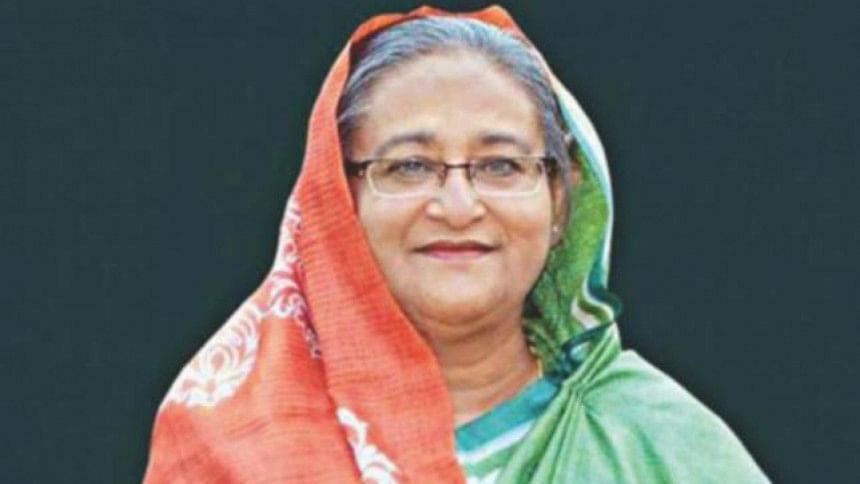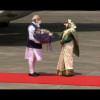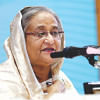Myanmar has failed to act

Prime Minister Sheikh Hasina has said it is unfortunate that Myanmar has failed to create a congenial atmosphere to take back Rohingyas, despite signing an agreement with Bangladesh on repatriation.
"We already have signed an agreement with the Myanmar government and they agreed to take them back. Unfortunately, it did not happen. We could not implement it," she said in an interview with Khaleej Times during her visit to Abu Dhabi on Tuesday.
Commenting on the slow progress of Rohingya repatriation deal inked last year, the PM said, " … unfortunately, the Myanmar government ... they fail to create a congenial atmosphere to take them [Rohingyas] back.
"Some of these people are not feeling confident to go back. But I think it is the duty of the Myanmar government to create such an atmosphere so that these people feel some kind of confidence to go back."
Myanmar should take the responsibility and allow the Rohingya refugees to return as they are their citizens, she said.
About 750,000 Rohingyas fled brutal military campaign against them since August 2017. They joined nearly 300,000 other Rohingyas, who had fled earlier waves of violence in Myanmar's Rakhine State where they have been denied citizenship and basic rights, including health and education.
When asked whether the international community is doing enough to put pressure on Myanmar, Hasina said, "Actually they are trying. No doubt about it. But somehow, I don't know why it is not working well."
The PM said she is hopeful about Rohingya repatriation. "Some day will come when Myanmar will also realise that this is not the way. They [Rohingya] are their citizens and definitely they should take them back."
Hasina refuted allegations that her country was in a hurry to send back the Rohingya refugees despite the unsafe conditions.
"It is not true. But how long can people live in a refugee camp? Those who are saying this, they have never been to a refugee camp. And perhaps, they have not lived as a refugee. But I can understand."
INDIAN CITIZENSHIP BILL
Hasina said she did not understand the purpose of the Indian Citizenship Amendment Bill passed by the lower house of Indian parliament to give Indian citizenship to minorities that faced "religious persecution" in neighbouring countries, including Bangladesh.
"Why this bill … I don't understand," she said and asked with a smile, "Is it for election purpose?"
In an interview with Gulf News on Tuesday, the PM said she never felt that the bill meant to blame Bangladesh for religious persecution of minorities in the country.
"I don't think so. There is no such [religious persecution] in Bangladesh. Some incidents have happened. But we took immediate action."
Hasina said religious extremism and terrorism are a global problem. "It is not in Bangladesh alone."
She said her understanding was that people in India are also not happy with the bill. "I think they [India] should not do anything that creates tension."
'MIGRANT WORKERS DOUBLE'
In another development, Hasina said the number of Bangladeshis going for overseas employment has been doubled in the last four years, although it has not positively reflected in remittances to the country.
In the Bangladeshi financial year 2014-2015, 453,398 Bangladeshis got overseas employment and in the financial year 2017-2018 it became almost double -- over 867,128, she told Gulf News.
However, the increase in number of overseas workers has not positively reflected in the overall remittances to Bangladesh during the same period, as per the figures provided by the PM.
In 2014-15, the total inward remittance was $15,316 million, which dropped to $14,931 million in 2015-16 and to $12,769 million in 2016-17.
"But the situation has improved in 2017-18 with a total remittance of $14,981 million due to some policy measures taken by the government to use formal channels. The trend of this year is robust -- $9,087 million in seven months. Hopefully, it will cross $15,000 million at the end of the fiscal year," Hasina mentioned.
In her meetings with top UAE leaders, Hasina said she would like the UAE to become a prominent development partner.
"Investment is a potential area of cooperation. There are several proposals of UAE investment in the area of power, energy, special economic zones etc. in Bangladesh," she said.
The UAE-Bangladesh annual bilateral trade stands at $1.2 billion and there are huge potentials to further expand the trade, the PM added.

 For all latest news, follow The Daily Star's Google News channel.
For all latest news, follow The Daily Star's Google News channel. 








Comments